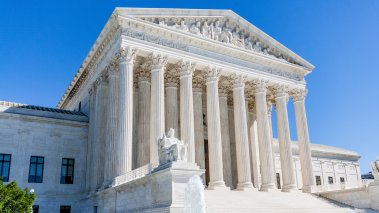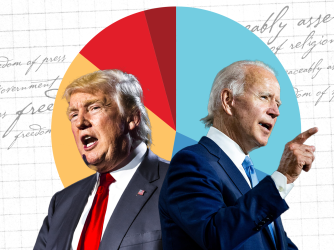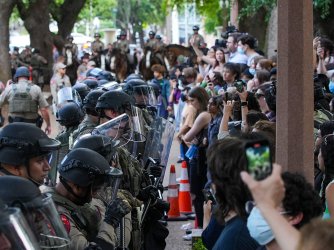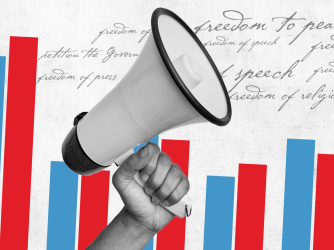Table of Contents
FIRE asks Supreme Court to uphold First Amendment right to boycott

davidsmith520 / Shutterstock.com
Political boycotts are protected expression under the First Amendment. The U.S. Supreme Court recognized as much forty years ago in NAACP v. Claiborne Hardware (1982). But that precedent is under attack.
A recent rash of laws bar government contractors from participating in boycotts of goods and services originating from Israel. While courts around the country have enjoined several of these laws, the U.S. Court of Appeals for the Eighth Circuit recently upheld Arkansas’ anti-boycott law, leading the plaintiff newspaper, the Arkansas Times, to seek relief from the Supreme Court.
For many years, the Times contracted with an Arkansas public college to publish paid ads for the college. In 2018, after Arkansas passed its anti-boycott law, the college required the Times to certify it was not and would not be engaging in a boycott of Israeli products and services. The newspaper refused and filed suit seeking to enjoin the law as violating its First Amendment rights.
Despite the clear precedent holding a boycott constitutes protected expression, the Eighth Circuit ruled against the Times. The Court held Arkansas can regulate state contractors’ commercial activities, using a strained interpretation of Claiborne Hardware to claim the decision protected only activities related to boycotts, not direct participation in boycotts.
Today, FIRE and the Forum for Constitutional Rights filed an amicus curiae — “friend of the court” — brief in support of the Arkansas Times’ request for the Supreme Court to hear its case. Alongside counsel of record Mahesha P. Subbaraman, the groups ask the Court to protect the First Amendment right to engage in politically motivated boycotts and to counter the broader nationwide surge in viewpoint discriminatory legislation from across the political spectrum.
Simply put, the Eighth Circuit got this one wrong.
Free speech protections are illusory if the government can put its thumb on scale for one side of a debate by restricting the other side’s speech.
First, political boycotts are expressive actions protected by the First Amendment. They are a part of a long U.S. tradition that includes The Boston Tea Party, Montgomery bus boycotts, anti-apartheid boycotts, Southern Baptist boycotts of Disney, PETA’s call to boycott Sea World, and recent calls to boycott the 2022 Men’s World Cup. The Supreme Court could not have been clearer in Claiborne Hardware: “The right of the States to regulate economic activity could not justify a complete prohibition against a nonviolent, politically motivated boycott.”
The First Amendment prevents the government from forcing anyone to swear against taking political action, including boycotts, as a condition to obtaining a government contract.
As described in our amicus brief: “Claiborne cannot be squared with the Eighth Circuit’s decision in this case. By treating boycotts as nothing more than commercial activity, the Eighth Circuit sweeps away all the ‘elements of [a] boycott’ that constitute ‘speech or conduct’ protected by the First Amendment.”
Arkansas Times LP v. Waldrip
Case Detail
A 2018 Arkansas law stripped state contractors of that right regarding boycotts related to goods and services originating from Israel.
Second, Arkansas’ anti-boycott law is blatantly viewpoint-discriminatory. It bans advocating for one side of a hotly contested political issue. But the Supreme Court has repeatedly told local, state, and federal officials that they cannot take sides like this. Even in the limited circumstances that permit speech regulations, the government must be “viewpoint neutral” — in other words, it must regulate speech without favoring one perspective over another. Here, Arkansas is regulating speech perceived to oppose Israel.
FIRE is, of course, neutral on the merits of the Israeli-Palestinian conflict. But whatever one’s perspective, free speech protections are illusory if the government can put its thumb on scale for one side of a debate by restricting the other side’s speech. The amicus brief asks the Court to strongly affirm NAACP v. Claiborne Hardware to “stem the tide of legislation that risks washing away the free trade of ideas.”
Proponents of this anti-boycott legislation presumably believe laws like that passed in Arkansas help combat anti-Semitism. But that aim must be furthered through means that do not involve suppressing protected speech. The Supreme Court must firmly adhere to Claiborne Hardware, one of its most important free speech precedents.
You can read FIRE and the Forum for Constitutional Rights’ full brief here.
Recent Articles
FIRE’s award-winning Newsdesk covers the free speech news you need to stay informed.

New FIRE poll: Americans equally skeptical Biden or Trump will protect First Amendment rights

Here’s what student journalists need to know about covering campus protests



